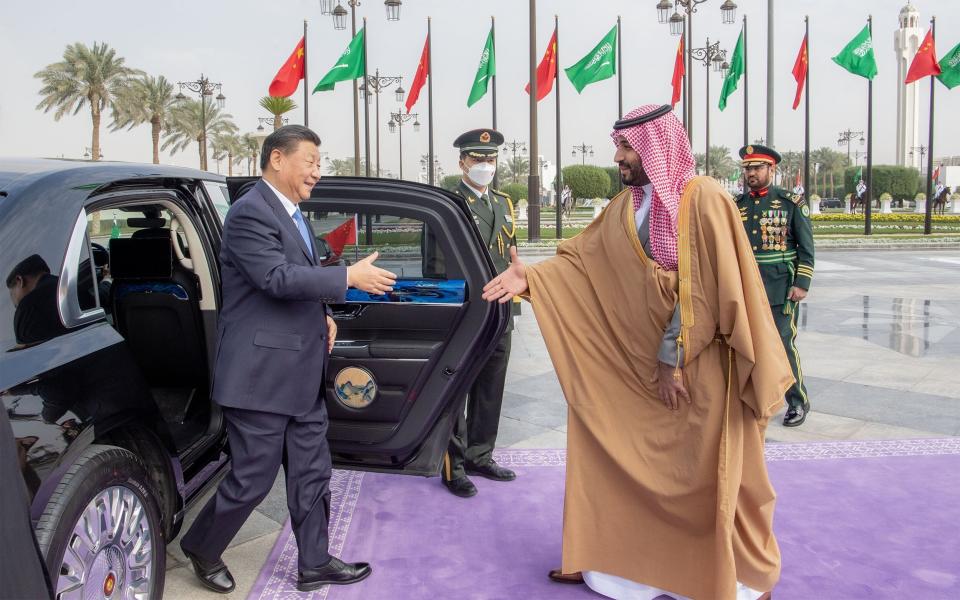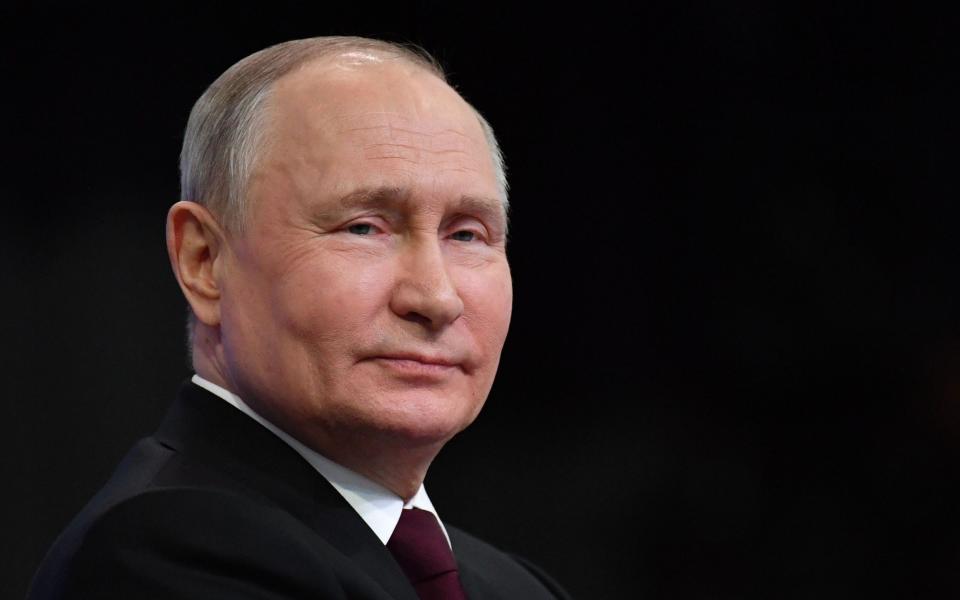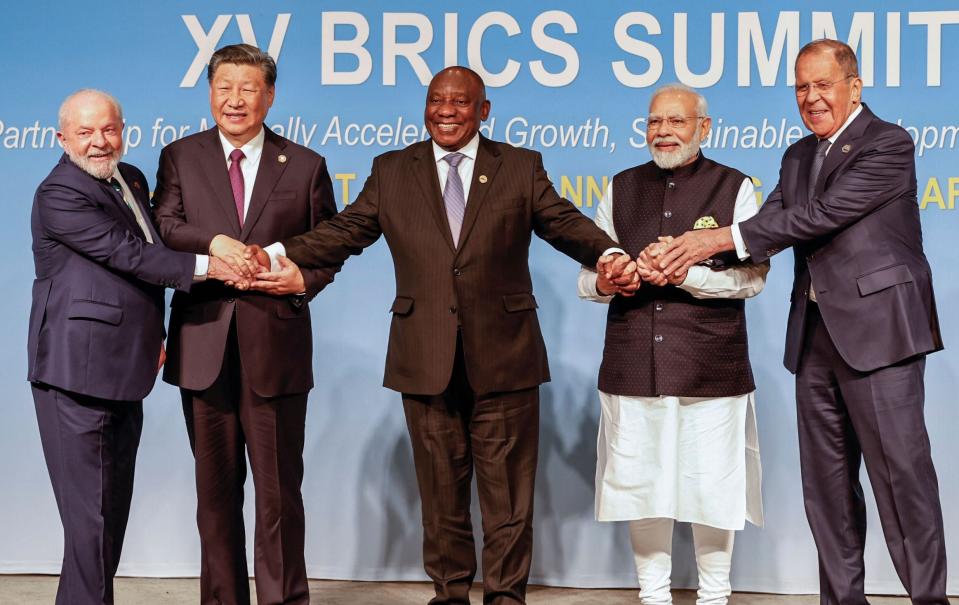How Xi Jinping is challenging dollar dominance with landmark Saudi deal

When Xi Jinping visited Riyadh, Saudi officials rolled out not a red but a purple carpet.
The Chinese president’s plane was escorted by Saudi jets spurting green and white smoke to symbolise the colours on the Gulf nation’s flag. Celebratory cannons were fired. A royal guard on Arabian horses escorted President Xi to the Royal Palace.
The warm reception during the visit last December was symbolic of deepening ties between China and Saudi Arabia. Long one of the US’s closest allies in the Middle East, Beijing is trying to woo the Kingdom towards the East – and Saudi leader Mohammed bin Salman appears open.
President Xi has ambitions to challenge the global dominance of the dollar. One way to do that would be to start trading oil and gas in renminbi.
Saudi Arabia, the world’s largest crude oil exporter, has traded oil entirely in dollars since 1974. But talks about pricing sales to China, Saudi’s largest trading partner, in renminbi have been accelerating. In November, China made a breakthrough.
China and Saudi Arabia signed an agreement to set up a currency swap line worth 50bn yuan (£5.5bn). The landmark deal means Saudi Arabia has free access to a supply of Chinese currency at a set exchange rate, and vice versa for Beijing and the Saudi riyal.
Swap lines in themselves are uncontroversial. China has one with the UK, and the deal with Saudi Arabia is small in scale, worth only a fraction of Saudi Arabia’s total trade with China. But the deal is a significant turning point.
If China’s oil and gas trade operates in renminbi, it will be outside the Western financial system and effectively unsanctionable.

Establishing the framework of a swap deal also allows it to be scaled up relatively easily. While 50bn yuan is small, the total size may well grow.
“It’s mostly a signal that Saudi is willing to use renminbi,” says Alicia García-Herrero, chief economist for Asia Pacific at French investment bank Natixis and a senior fellow at European think tank Bruegel.
Saudi Arabia is under pressure to accept the renminbi because Russia, China’s largest oil trading partner, already does.
The idea of China seriously challenging the dollar’s dominance has been dismissed by many economists as far-fetched. The dollar is still in a different league globally because such a large share of public and private debt worldwide is held in dollars.
The US currency is used in nearly half of all payments worldwide, while the renminbi is used in less than 4pc, according to Swift data. The dollar is freely convertible, the renminbi is not and China has restrictions on capital flows.
But the number of transactions involving the renminbi is rising at breakneck speed. In the last three years, global use of the Chinese currency in trade finance has tripled. In September, it overtook the euro as the second-most used currency in global trade. Data from the People’s Bank of China shows that, globally, central banks’ use of Chinese swap lines has roughly quadrupled since 2020.
“It is making exponential gains in the share of trade finance,” says Phyllis Papadavid, senior research advisor at Asia House. “It is making gains in its use as a reserve currency. The overall share is still quite low, but the trajectory is very rapid.”
In several decades’ time, it is feasible that the renminbi could challenge the dollar, says Julia Gurol-Haller, lecturer at the Chair for International Relations at Freiburg University.
“I think in the very, very long run this could be something that manifests.”
In the more immediate future, China may be able to protect its energy security as tension with the US intensifies.
“It takes the dollar out of the loop,” says Christopher Vassallo, a researcher at the Asia Society Policy Institute’s Center for China Analysis. “If China wants to pay Saudi Arabia for a certain amount of oil imports, they can use their currency.”

This has become a mounting concern for Beijing since the onset of the war in Ukraine.
“Beijing watched Washington impose sanctions on Russia’s dollar reserves that simply made the dollar not useful for Russia,” Vassallo says.
President Xi is more vulnerable to financial sanctions than Vladimir Putin because China’s economy is much more dependent on imports and exports. Boosting renminbi trade with allies helps to insulate China from any US intervention.
“In the short-term, it’s about the security of energy needs,” says Gurol-Haller.
The lynchpin of this strategy is the Middle East – and Saudi Arabia knows it.
“I was in Riyadh when the war broke out in Ukraine and you could immediately see this new self-consciousness rising, this sense that this is our moment,” says Gurol-Haller. “Countries in the region realised they can leverage relations with other big players in a different way.”
Before the war, Saudi Arabia operated a hedging strategy of keeping both the US and China in balance, says Gurol-Haller. “Since February 2022, we have seen quite a pivotal shift towards China as an economic partner.”
China is the number-one destination for Saudi exports by value and the Kingdom is China’s second-largest oil supplier, after Russia.
In addition to oil, the two nations have deepened their ties in the tech and science sectors, and Saudi Arabia is turning towards China for security.
In March, China brokered a reconciliation deal between Saudi Arabia and Iran, leaving the US on the sidelines.
“That shows that China is no longer viewed by regional players as just an economic partner but also as a rising political or security force,” says Gurol-Haller. “That is a paradigm shift.”

In the same month, Saudi Arabia agreed to join the Shanghai Cooperation Organisation, a security union that includes China and India. This summer, Saudi Arabia was invited to join the Brics alliance of Brazil, Russia, India, China and South Africa.
Brics members have been discussing how to make a common currency that can be used in emerging markets.
Gurol-Haller says: “It is discussed so much among this growing, non-Western or anti-US, bloc. It is the finance side to a larger geopolitical phenomenon, which is to reduce dependency from the United States in terms of security and the economy, and then also in terms of currency.”
The next step for China and Saudi Arabia could be potential stock exchange partnerships. In February, Hong Kong chief executive John Lee travelled to Saudi Arabia in a bid to encourage the national oil giant, Saudi Aramco, to pursue a secondary listing in Hong Kong.
“The overall momentum of this building of an anti-Western bloc will create geopolitical implications for the US,” says Gurol-Haller. “In the Middle East, we already see a diminishing role of the US. That is exactly the phenomenon that such swap lines make stronger.”
While dollar dominance persists for now, the Beijing-Riyadh alliance shows its primacy will not continue unchallenged.
